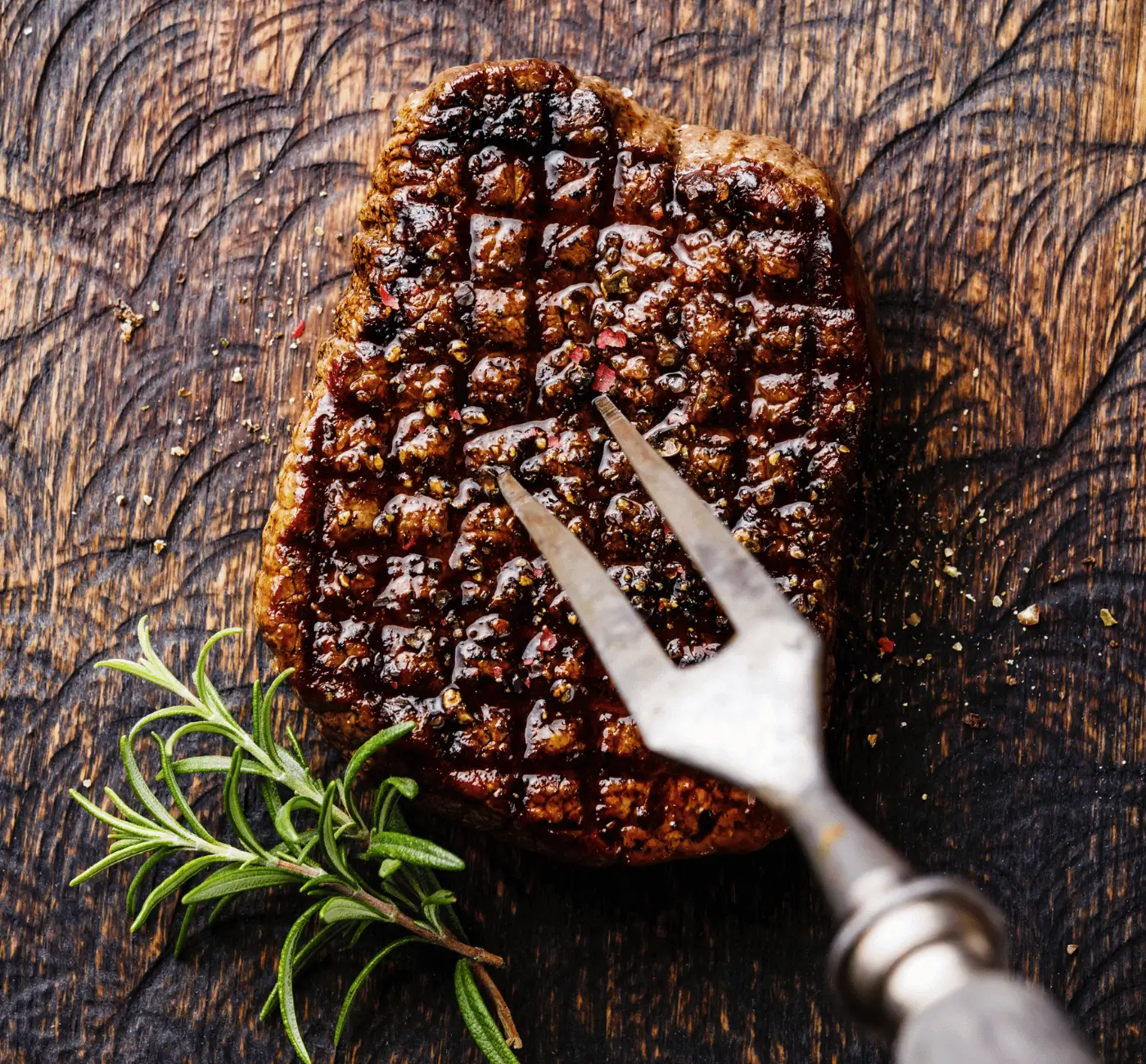
For as long as humans have been on earth, we’ve relied on organ meats to survive, evolve, and thrive. Organ meat supplements are a way to reclaim that ancestral nutritional wisdom.
As a species living in close connection with the natural world, we developed an instinctive palate for the parts of animals that offered the most nutrient density and variety. This always meant organs–nature’s original multivitamin!
But with the dawn of agriculture, and the recent advent of industrialized food, we lost both our knowledge of, and palate for these organ meat superfoods.
The good news is that with beef organ meat supplements, you don’t have to develop a taste for bovine heart, liver, kidney, pancreas, and spleen to get their benefits. All you need is a glass of water.
Let’s explore the health benefits and nutrition of beef organ meat supplements, and compare the top organ meat supplements on the market.
A beef organ meat supplement is a dietary supplement that contains a number of dried bovine organs.
The organs most commonly found in beef organ supplements include:
Less common, but particularly beneficial is the inclusion of beef brain: As of this writing, Doctor Kiltz’s Nutritional Solutions is one of the very few organ meat supplements that offer it.
The healthiest organs come from the healthiest cows. These happen to be grass-fed, pasture-raised cattle from New Zealand–which we’ll explore a bit more later on.
Most quality beef organ meat supplements are “desiccated.” This simply means that they’re dried. Manufacturers of the highest quality beef organ meats supplements desiccate their products using a gentle freeze-drying process.
This transforms raw organs into a powder that can be conveniently stored in gel capsules. Unlike high-heat processes that degrade nutrient quality, freeze-drying retains much of the vitamins, minerals, and co-factors of the fresh organs.
Freeze-drying also reduces the water weight, allowing you to consume less of this less-than-pleasant tasting meat, while still receiving its full array of nutritional benefits.


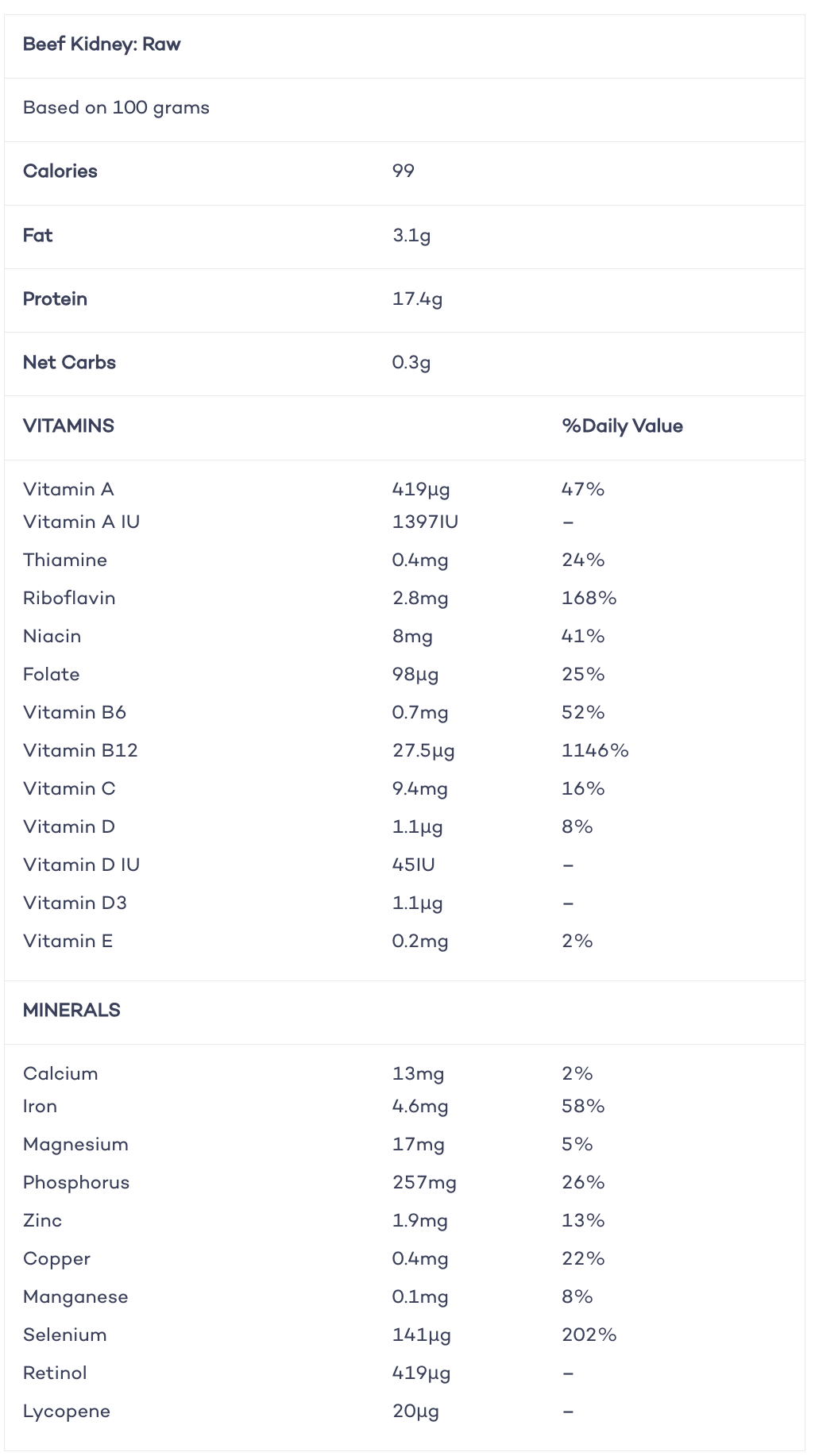

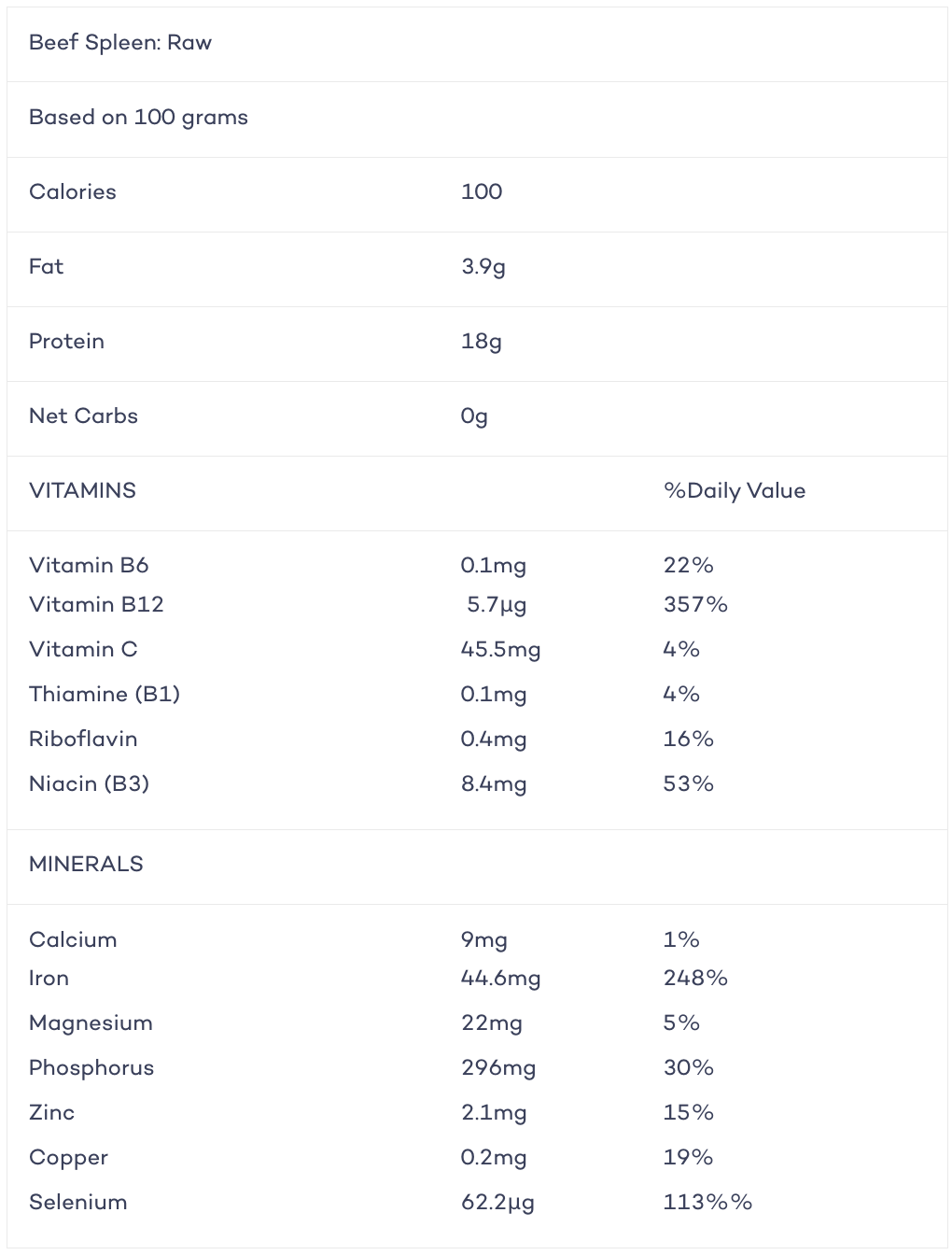
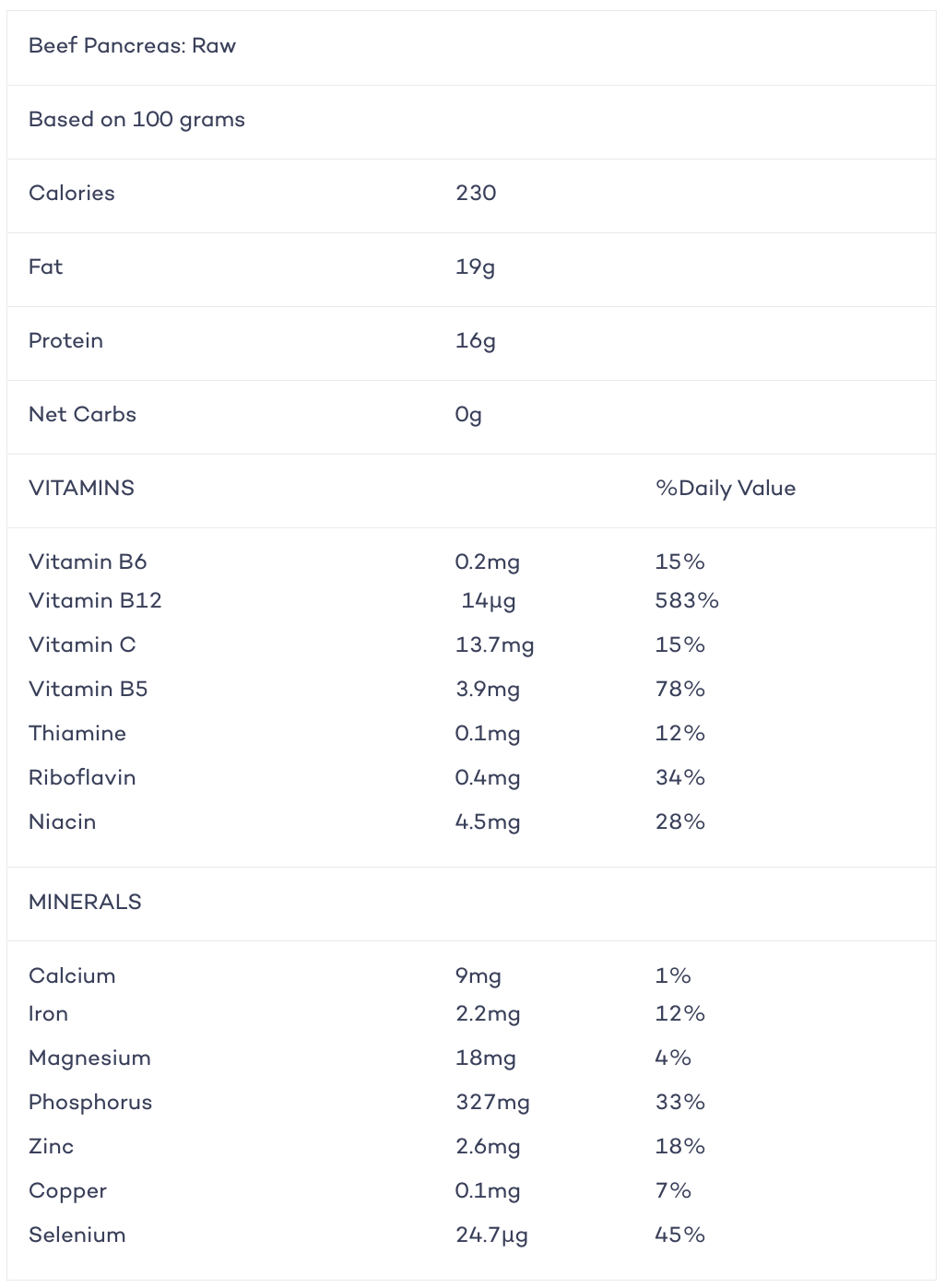
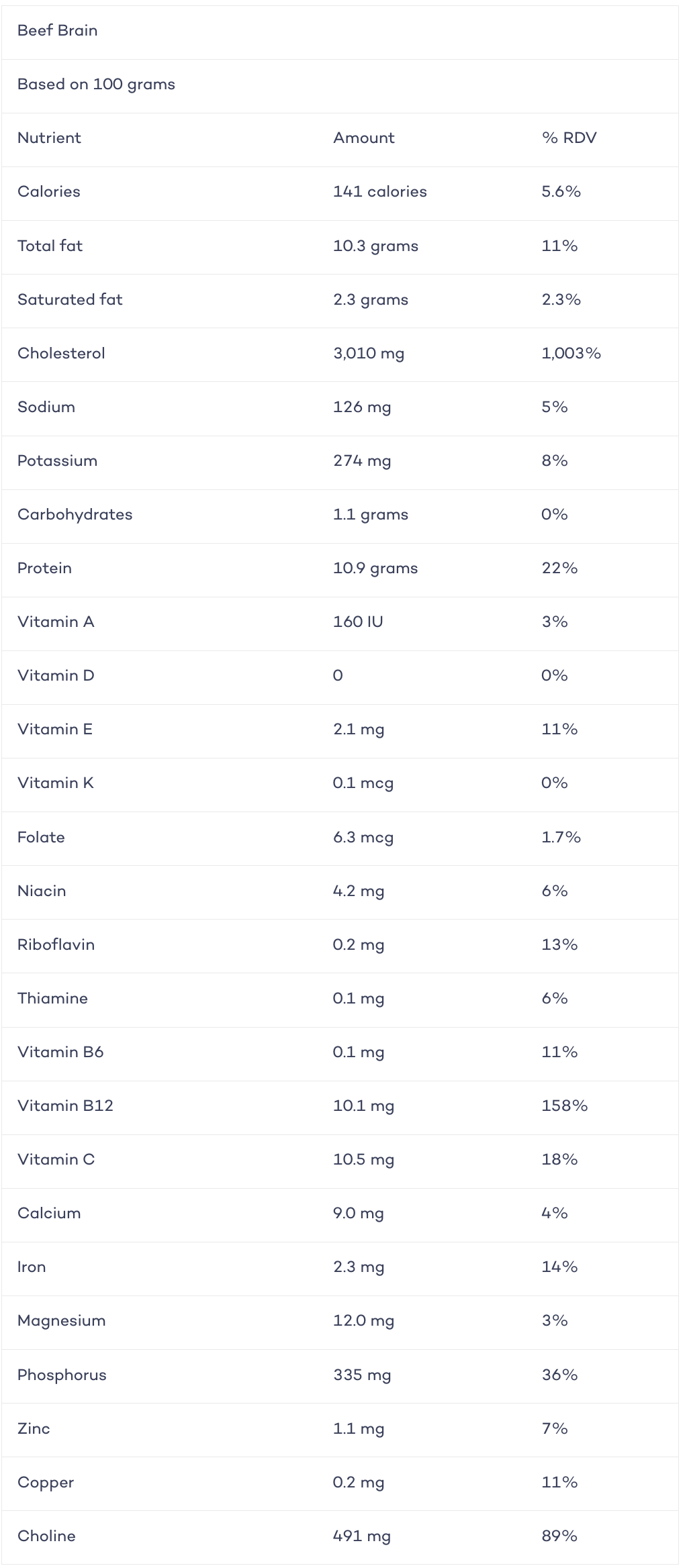
Beef organs are loaded with vitamins, minerals, and rare amino acids (peptides) that offer numerous health benefits.
One of the fascinating properties of organ meats is that each organ you consume can supply specific nutrients to the corresponding organs in your body!
Organ meats provide literally hundreds of specific benefits, so let’s take a look at some of the highlights.
The liver, kidneys, heart, and spleen are packed with iron. And they contain it in the bioavailable form known as heme iron. The body does a much better job of absorbing heme iron than the non-heme iron found in plant foods. [1]
This makes beef organ supplements especially beneficial to the 10 million Americans who are iron deficient. And one of the primary symptoms of iron deficiency is fatigue and lack of energy. Boosting iron intake from organ meat supplements can balance deficiencies and restore energy.
The full spectrum of B vitamins in beef organ supplements is key to turning food into usable energy.
The coenzyme Q10 (CoQ10) found in liver, heart, and spleen has also been shown to improve energy levels. [2]
The selenium in beef liver has been shown to support brain function, which can be especially important for older adults, since research shows that selenium levels decrease with age. [3] The copper in beef liver, and the other meats found in beef organ supplements can support cognitive performance.3
Beef organ supplements are also loaded with Niacin (vitamin B3) which has been shown to play an important role in healthy cognitive functioning. [4]
The fats found in organ meats are especially high in stearic acid–a saturated fatty acid. Studies show that stearic acid is associated with improved body fat, improved mitochondrial function, and weight loss. [5]
A peptide in organ meats called Liver Expressed Antimicrobial Peptide (LEAP-2) has been shown to reduce hunger and weight gain, while balancing blood sugar, especially during periods of reduced caloric intake.2 This makes it the perfect nutrient to support healthy eating patterns, like intermittent fasting.
The B vitamins found in abundance in beef organ supplements may also improve your body composition by supporting fat burning. [6] [7]
Beef organ supplements are loaded with extremely bioavailable forms of vitamins A, C, D, and K2. Individually and together, these vitamins are important for maintaining a healthy immune system.
Hepcidin, a peptide found in beef liver, helps the body absorb and process iron, while offering antibacterial properties. Together these factors inhibit the ability of pathogens to adapt to our immune responses. [8]
It’s worth noting that organ meats are one of the only animal food sources of vitamin C, making them a key component of a long-term carnivore diet.
These same vitamins that support the immune system, are vital to the health of our bones.
Vitamin D helps our bodies absorb calcium. Vitamin A helps the body utilize calcium. And vitamin K2 distributes the calcium to the places that need it.
The pioneering nutrition researcher Dr. Weston A. Price found that “An essential characteristic of the successful dietary programs of [traditional peoples], has been found to relate to a liberal source of fat-soluble vitamins.” [9]
Pancreas organ meat contains a compound called gastrin-releasing peptide (GRP), that supports digestion by stimulating your body to release bicarbonate and digestive enzymes.
Beef organ supplements also contain digestion-boosting co-enzymes and peptides like colipase, trypsin, and pancreatic peptide, that activate enzymes that break down protein, while reducing food allergies.
Beef organ supplements are high in Vitamin B12 and folate. When combined these vitamins help moderate blood homocysteine levels.
The peptide known as DWORF (Dworf Open Reading Frame) found in beef heart, has been shown to support the heart’s overall function and strengthen its contraction. [10] [11]
Heart is also a great source of coenzyme Q10 (COQ10), an anti-fatigue, anti-aging nutrient.
Kidney contains the hard-to-find amino-acid Ergothioneine, which promotes fertility. [12]
Beef organ benefits are also loaded with B-12, which promotes fertility and infant development.
We see this fact reflected in the wisdom of traditional cultures whose pregnancy diets included liver and other organs. These diets often included free range grass-fed beef, dairy products like cheese and yogurt, and fish roe, too. [13]
Traditional foods expert Sally Fallon describes this phenomenon: “Without knowing the names of the vitamins contained in these foods, isolated traditional societies recognized their importance in the diet and liberally ate animal products containing them. They rightly believed such foods to be necessary for fertility and the optimum development of children.” [14]
Modern research supports these practices revealing that vitamin C, E, D, and B12 are key factors in healthy fertility. [15] [16]

When looking at the historical importance of organ meats, and their science-backed benefits, it makes you wonder why they’re not a regular part of our diet? Though a nose-to-tail lifestyle is gaining in popularity, there are a few challenges that are hard to get past.
Organ meats don’t taste like what most of us have come to think of as meat. To the uninitiated, they’re often described as gamey, metallic, and generally gross. They can also smell “different” than the meat we’re used to.
Organ meats can also be difficult to prepare in a way that’s palatable–especially when cooking for family members who aren’t motivated by the health benefits.
Even for those of us who are interested in making organ meats a part of our regular diet, it can be difficult, and in many cases impossible to source high-quality organs from healthy grass-fed sources.
If after reading the above you find yourself checking all the boxes, organ meat supplements may be the best way for you to receive all the benefits while avoiding any drawbacks.
Now when it comes to choosing the beef organ supplement that’s right for you, it’s good to know what to look for.
Research shows that Grass-fed, grass-finished beef offers more nutrients than grain-fed varieties. [17]
This includes both micronutrients (vitamins and minerals) and macronutrients like fats and amino acids. For instance, grass-fed meat contains fewer inflammatory PUFAs (polyunsaturated fatty acids) [18]
The organs of grass-fed beef also contain more CLA (conjugated linoleic acid ) than grain-fed cattle organs. [19] CLA, in turn, has been shown to improve weight loss and muscle mass. [20] [21]
As we touched on above, healthy cows make healthy organ meat supplements. Research suggests that ‘healthy’ extends to emotional wellbeing. The stress an animal endures can have major effects on its overall nutrition. [29]
So it’s likely a healthy and humane choice to choose beef organ supplements from happy, pasture-raised cows.
Freeze drying is far more effective in capturing and preserving the nutrients from fresh organs when compared to standard extraction processes that use heat. [22]
New Zealand has a rich heritage of pasture-raised and grass-fed cattle ranching. This is thanks in large part to a perfect climate of mild, wet winters, and sunny summers yielding nutrient-rich emerald grasslands year round. This means New Zealand cattle are among the world’s healthiest and well-cared for cattle. . [23]
Most ranchers in America have to keep their cattle indoors during winter months. And even if these cattle are grass-fed, they have to rely on dried hay for significant periods. Additionally, New Zealand has banned the use of GMO agriculture, which is not the case in America, where even grass-fed cattle most often consume grass grown with GMO seeds.
The superior quality of cattle New Zealand ranching directly translates into superior quality organ meats.
Let’s take liver for example. According to the U.S. Department of Agriculture, New Zealand beef liver offers significantly more nutritional value than U.S.-raised beef liver. Some key nutrient differences include:
Vitamin B12 – New Zealand beef liver has 43% more than U.S.-raised beef liver.
Vitamin B5 – New Zealand beef liver has 44% more than U.S.-raised beef liver.
Iron – New Zealand beef liver has 72% more than U.S.-raised beef liver.
Thiamin (Vitamin B1) – New Zealand beef liver has 96% more than U.S.-raised liver.
Vitamin A – New Zealand beef liver has a staggering 459% more than U.S.-raised liver.
The healthiest foods are additive-free, and that extends to beef organ supplements. Look for brands that assure you their organ supplements are without stearates, binders, lubricants, fillers, and flow agents.
Most beef organ meat supplements call for 3000 milligrams as day, or about ¾ of 1 teaspoon.
This doesn’t sound like much, but keep in mind that organs are both nutrient-packed and desiccated (dried).
In their fresh state, the majority of organ meats are water. For example 3000 g of dried beef organs are nutritionally equivalent to around 1 oz (28 g) of beef organs.
The pricing of beef organ meat supplements is another factor to consider. Keeping in mind the quality points listed above, we’ve found that moderately priced products can offer quality nutrition without adding in processed compounds that you don’t actually need just to increase the price.
Our three favorite beef liver supplements are all super high-quality products and contain 3000 mg, or 3 grams of freeze-dried beef organs. This is the nutritional power of roughly 1 oz or 28g of fresh organs.
Harvested from happy New Zealand cows, and manufactured to the highest industry standards. Of the comparable brands, Doctor Kiltz is the only organ meat supplement to offer beef brain.
Brain offers unique brain cell activators, brain-derived neurotrophic factor (BDNF), and other brain-boosting peptides that can enhance and maintain optimal cognition. [24]
+Shop Doctor Kiltz Nutritional Solutions Grass-Fed Beef Organ Meat Supplements
It’s no coincidence that three top brands provide nearly identical nutritional values. Their organs are all sourced from freeze-dried grass-fed and finished, pasture-raised, New Zealand Cattle. And they only and contain organ meats, without fillers or additives.
These are the key hallmarks of high quality beef organ supplements. If you come across other brands, you’ll want to make sure they check all of these boxes.
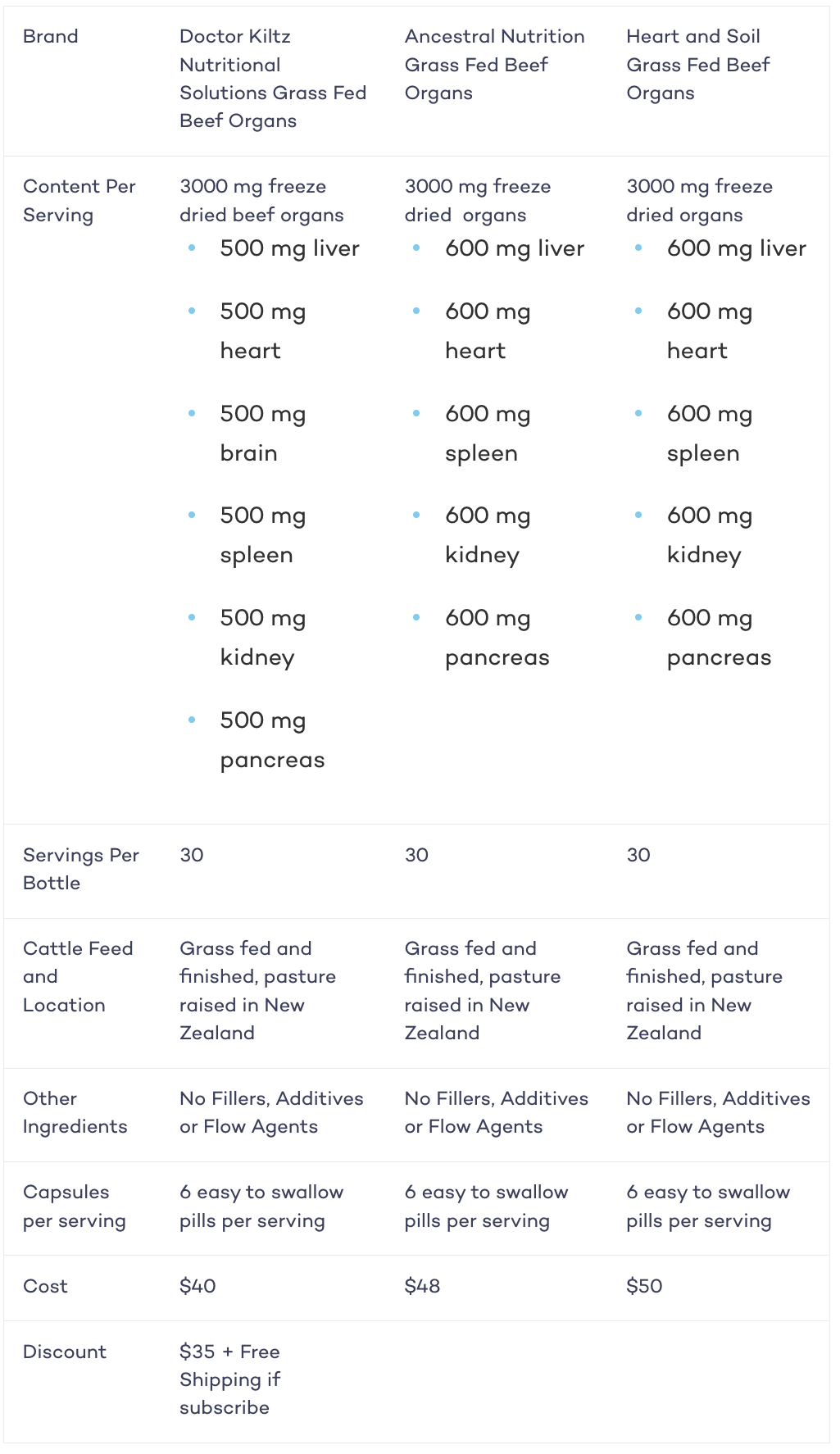
Humans have relied on organs for millennia. When considering their nutrient variety and density, it’s not stretch to consider beef organ supplements to be both a superfood and a natural multivitamin.
Just as important as the nutrient content itself is their bioavailability–or how effectively they are absorbed by the body and integrated into their vital roles. And organ meats offer many of the most bioavailable forms of key nutrients, in a complete package with co-enzymes and peptides that assist their bioavailability.
Beef organ supplements are a convenient and effective way to bring our ancient nutritional wisdom into our modern lives.


We’re a global community of seekers, healers, and doers committed to reclaiming health on our own terms. When you join the Kiltz Mighty Tribe (KMT), you’ll gain access to education, support, and collective wisdom.

